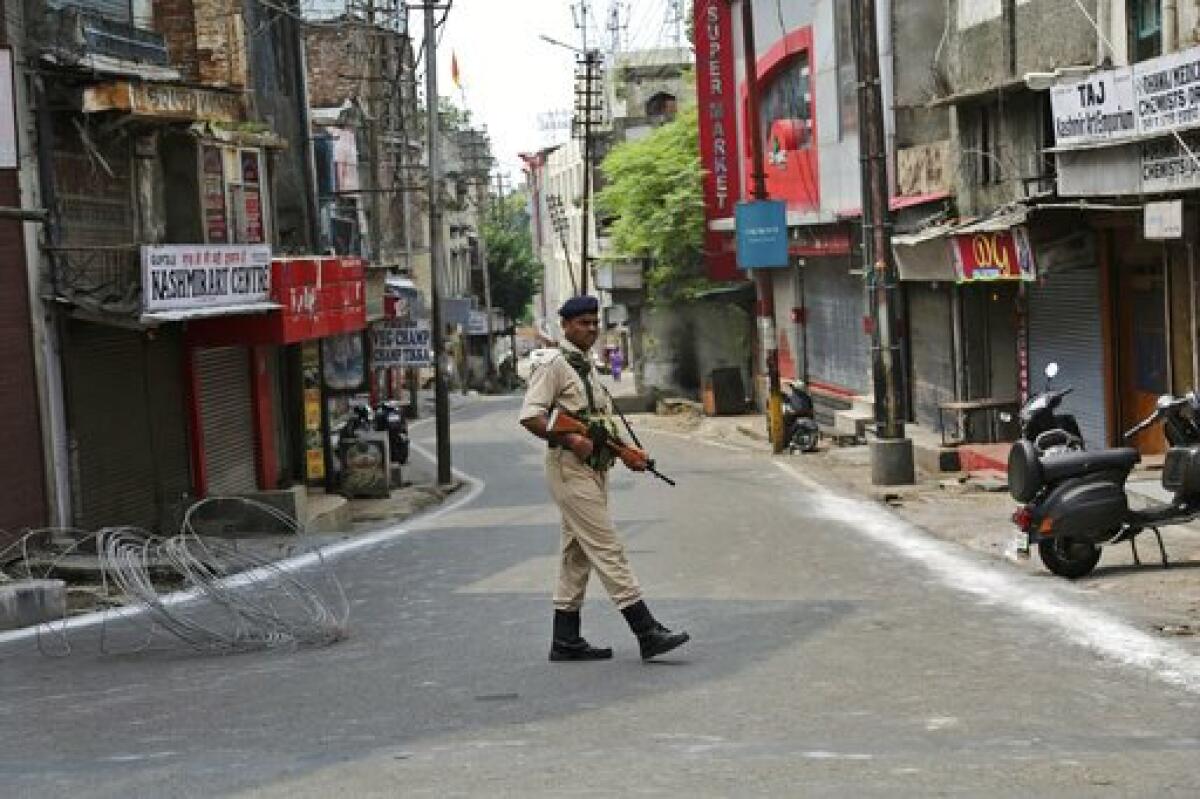Opinion: Trump’s silence on Kashmir sends a dangerous signal to the world’s autocratic leaders

- Share via
Just when we thought we’d seen every trick in the illiberal democratic playbook, along comes a particularly unnerving new one: Prime Minister Narendra Modi’s decision to remove the long-standing autonomy of Kashmir, the northern region at the heart of India’s 70-year dispute with its western neighbor, Pakistan.
The region was awarded to India during the 1947 partition that divided the subcontinent into two new states, India and Pakistan. But according to Article 370 of the Indian Constitution, the state of Jammu and Kashmir was to be granted autonomy over most governance issues, aside from defense and foreign affairs. Article 370 was largely honored until early this month, when Indian President Ram Nath Kovind, a member of the BJP party of Modi, followed up on the prime minister’s crackdown with a series of orders revoking the state’s autonomy.
Overnight, Kashmir’s historic status was lifted, and a communications blackout was imposed. Since then, thousands of Kashmiris have been arrested by Indian federal authorities.
There is, of course, a backstory to the Indian government’s actions. Muslims constitute nearly 70% of the population of the state and, therefore, represent a constant irritant and threat to the Hindu nationalists of Modi’s BJP, who aspire to achieve ethnic purity in India. Now that Modi has consolidated power with a landslide election in 2019, he is moving rapidly and boldly toward realizing the BJP vision of a Hindu India — one that bears little relation to the vision laid out in India’s Constitution, which guarantees justice, liberty, equality and fraternity to all.
But if there is a local context to these actions, there is also a global one. We inhabit an era of what Viktor Orbán, the Hungarian Prime Minister, calls “illiberal democracy.” Its chief promoters — Orbán, Modi, Russian President Vladimir Putin, Turkish President Recep Erdogan, Israeli Prime Minister Benjamin Netanyahu, our own president, Donald Trump — employ a similar range of tactics. They insult and denigrate their enemies, often on social media. They employ incendiary, inaccurate and often racist rhetoric against minorities, immigrants, and the poor. They erect physical and legal barriers at borders and deport law-abiding residents who are ethnically, racially or religiously different from the majority.
Lately, some of them have also sought to alter facts on the ground in order to justify aggressive actions in territorial disputes against putative enemies. Putin, who may be the first among equals in the club of illiberals, showed the way by invading eastern Ukraine in March 2014. Although much of the world, including the United Nations, regarded the action as an illegal annexation, Putin and his cronies rebranded their aggression as an act to restore self-determination to the people of Crimea. The imposition of sanctions by the European Union and the United States has had little political effect, and Putin is as resolute and ruthless as ever.
Now, Modi has followed suit in Kashmir. While the world’s attention was fixed on a host of other vexing issues — mass shootings in America, Brexit chaos, and climate change, to mention a few — Indian troops swept in, ostensibly to ensure security and prosperity to the restive area. The world has barely uttered a peep.
Given the ineffective response, first with Crimea and now with Kashmr, it may only be a matter of time before another of the illiberal squad strikes. Netanyahu, currently immersed in a fateful election campaign, might decide, say, to annex the West Bank.
The parallels between the Israeli-Palestinian situation and that of India and Kashmir are striking. Both are byproducts of attempted partitions after British imperial rule. Both Kashmir and the West Bank contain populations deemed hostile and undesirable by the ethnic purists in their respective countries. Both Modi and Netanyahu have shown themselves to be willing to resort to incendiary and threatening language against the Muslim populations in their midst. And both are abetted by the active support — or telling silence — of Trump.
What would Trump do if Netanyahu went ahead with his periodic pledge to annex the West Bank and its nearly 3 million Palestinians? Would he and his fellow illiberals sit back and crow that this is the new way of the world?
Perhaps so, and that is why the rest of us must rise up in protest each time illiberal leaders attempt to expand their powers in illegal and undemocratic ways. We must support civil society organizations that fight for the equality of their countries’ citizens, regardless of race or ethnicity. And we must insist that democratic countries honor the noble principles enshrined in their constitutions and other founding documents, for they are the best antidote to the xenophobia, racism and discrimination of today’s illiberalism.
David N. Myers teaches Jewish history at UCLA, where he directs the Luskin Center for History and Policy. He is also president of the board of the New Israel Fund.
More to Read
A cure for the common opinion
Get thought-provoking perspectives with our weekly newsletter.
You may occasionally receive promotional content from the Los Angeles Times.










